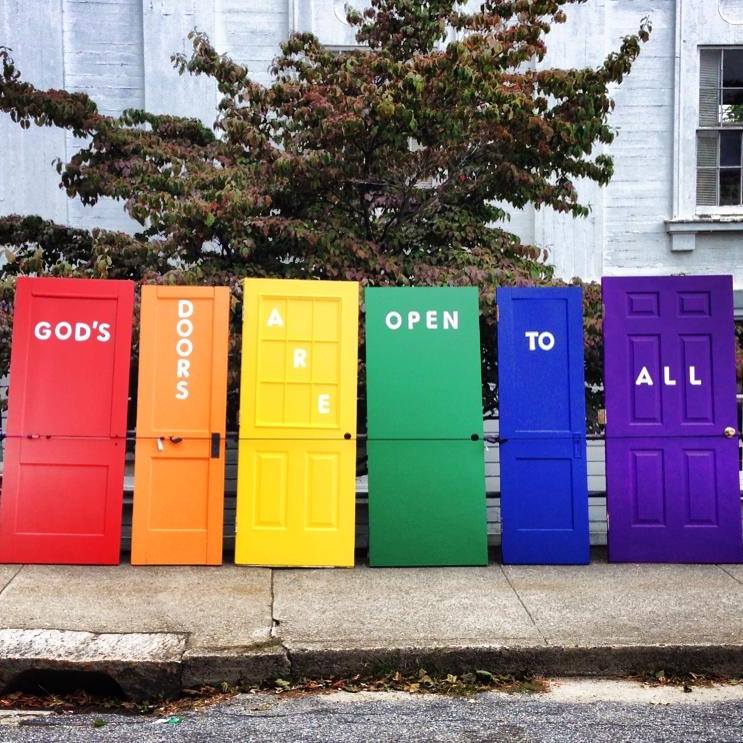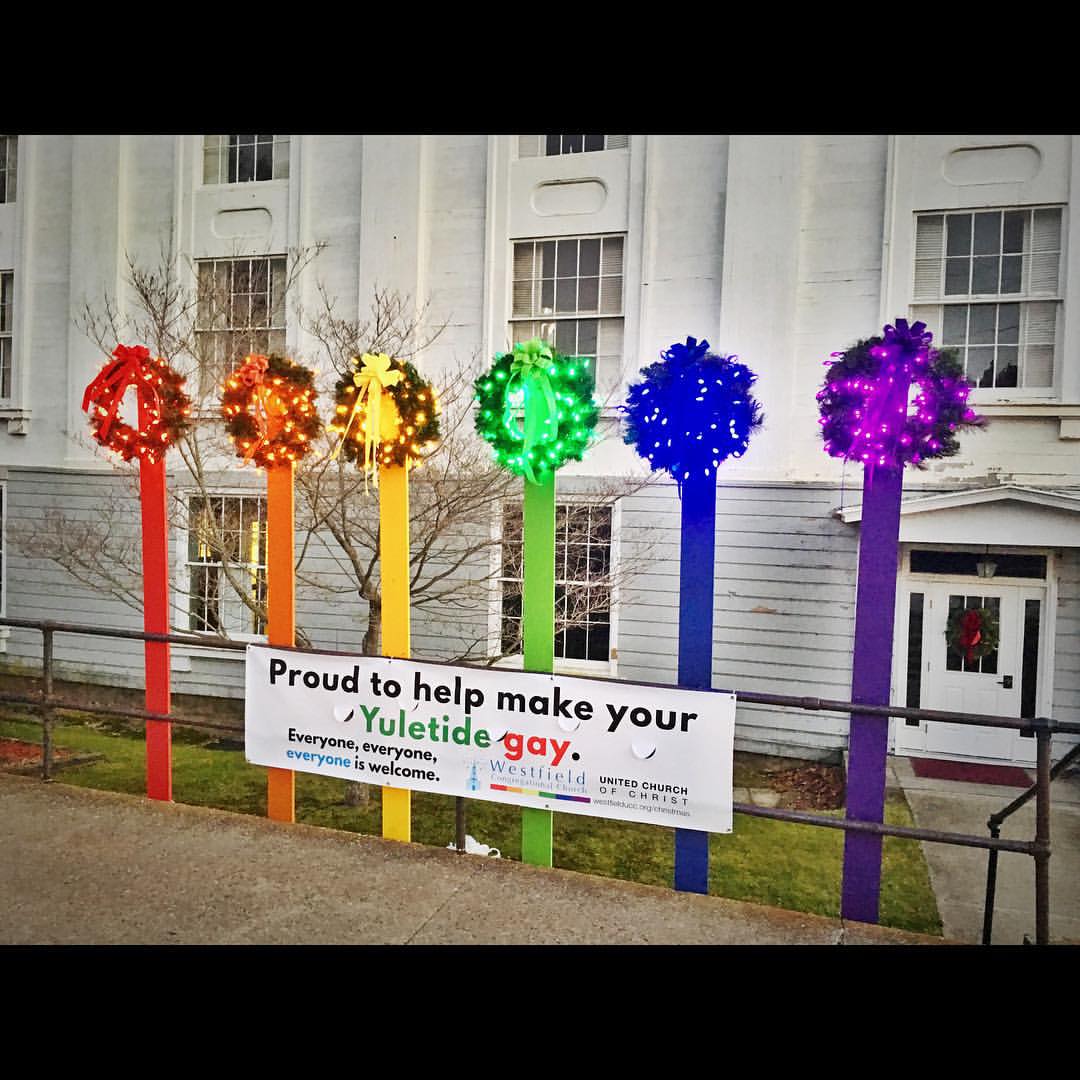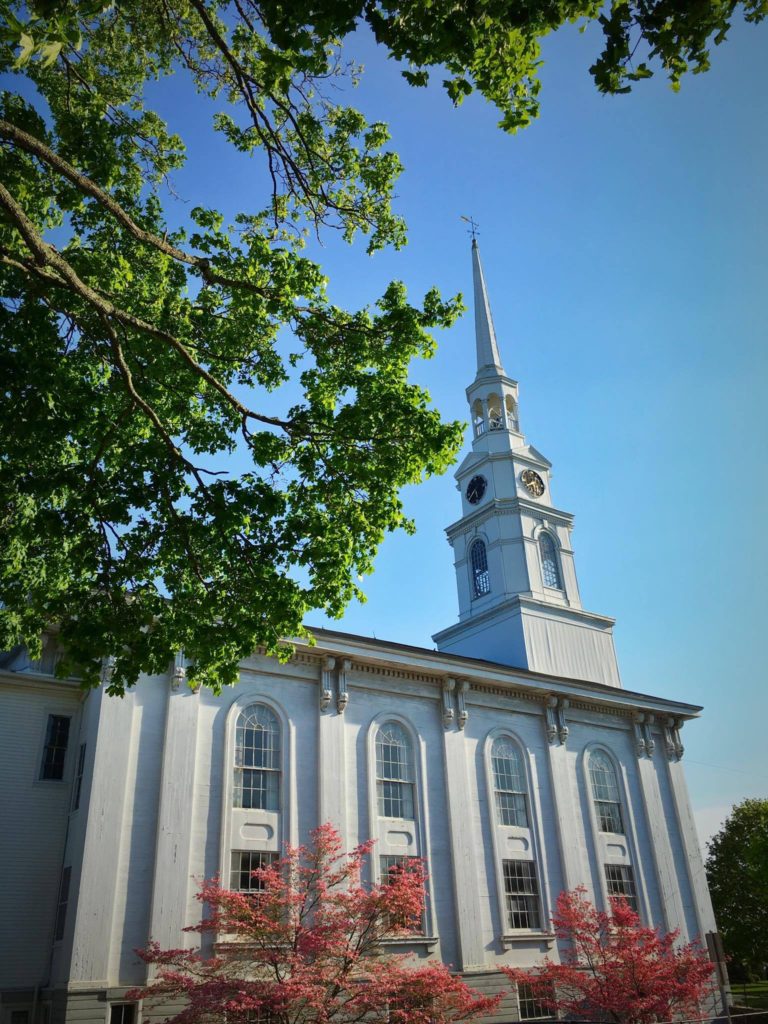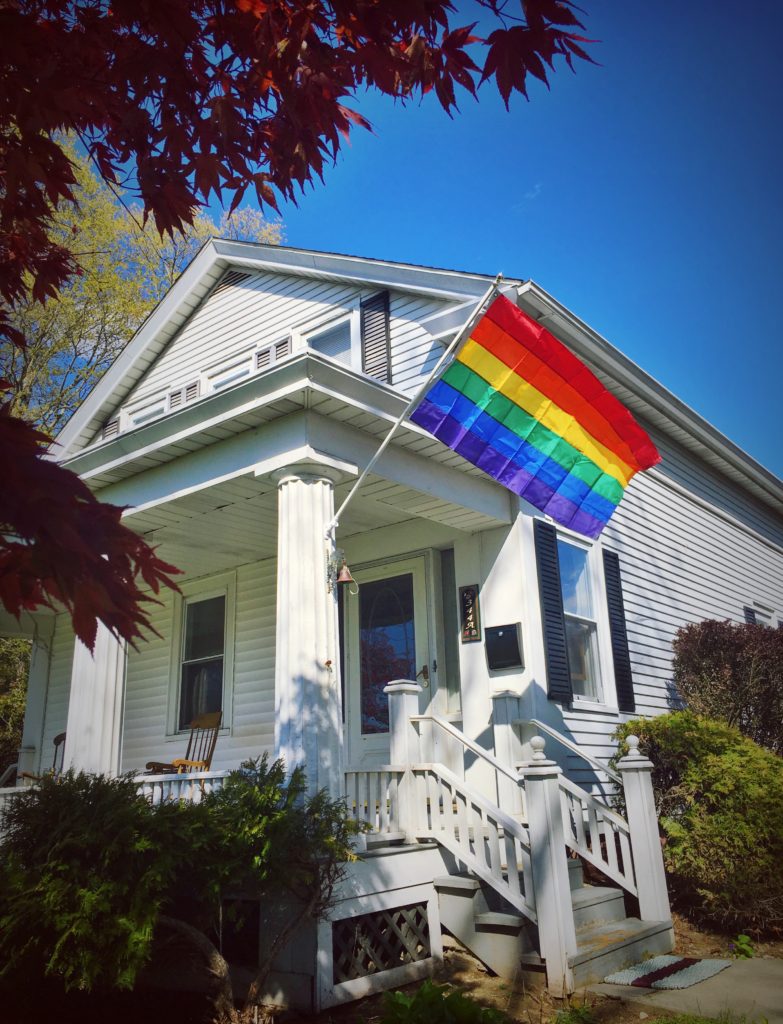Two days ago, I dragged the stepladder through our front door and set it up at the base of one of the wooden columns that line the front our our 1850s home. The house that we’re renting (mobility is a valuable commodity for pastors these days!) sits on the corner of a major intersection in our little town in Northeastern Connecticut. The elementary school is directly across Main Street from our little white house. We’re steps away from the library and local pizza joint and just down the street from the town green and the towering steeple of the church I serve. Every morning I wake up to the bell in my church’s steeple chiming the hour. It’s usually the last thing I remember hearing before I drift off to sleep. Our town isn’t perfect by any stretch of the imagination, but to visitors it’s quaint and quintessential. And for now, it’s home.
But it’s not the home I grew up in–that was a small town outside Atlanta. It wasn’t particularly rural (although it was markedly more country than city), but it was a place where you knew where people stood. There were some pretty clear lines drawn in the religious and political sands of the day. And one of those lines was homosexuality.
Growing up, before I came out, I remember riding in the back seat with my parents up front and looking out the window. I was searching for a sign–a sign that I could belong, that there were other people like me. There weren’t many signs like that in the little town I grew up in outside of Atlanta. But every once and while, I’d see a bumper sticker. Or, if we were in the city, a flag. I remember just one time riding by Piedmont Park in midtown Atlanta and glimpsing two men holding hands. I lived for those signs–reminders that there was more to my future than what society and the church were telling me.
We live in what’s called the Quiet Corner of the state. Some call it that pejoratively–others, lovingly. But either way, it’s an accurate name. Idyllic country roads are lined with centuries old stone walls made from the rocks farmers once cleared out of their fields. Not much happens here. It isn’t some grand, political crossroads where remarkable and earth shattering statements of justice are made.
And in that way, it’s just like the place I grew up: quiet, unassuming. Once I realized that I was living in the same town of my childhood, just nine states north, it became clear to me that someone riding down this quiet, unassuming Main Street was looking for the same signs I was so many years ago.
New Englanders are a curious breed. They’re overly pragmatic and fiercely loyal. They are at once progressive on some issues (LGBT rights, for instance) and conservative on others (in my neck of the woods, it’s gun control!). And they are also folks who don’t like being told what to believe. And so, when I drive down Connecticut back roads during election season, I see lots of candidate signs, but virtually no issue-based signs. The prevailing mentality is simple: you believe your way; I’ll believe mine–which makes things in this Southern New England state that’s allowed gay marriage since late 2008 seem great. Everybody’s on board here. Right?
Kind of. Until they aren’t.
My church, Westfield Congregational Church, United Church of Christ has taken to making unique statements about our belief in the breadth of God’s welcome. It started with six doors which lead to wreaths and banners, all with the same message–you’re welcome here.



One Sunday night during December, before one of our beloved Victorian Christmas services, a woman approached one of my church members ranting. “What do those wreaths mean?,” the woman asked. “Oh,” my church member started, “well, they mean we welcome everyone here—any race, creed, color, age, gay, straight—everyone.” That last bit seemed to be exactly what the woman was afraid of. She then proceeded to get more and more agitated with my member, who calmly responded to the woman’s anxious condemnations. “You’re not a Christian!” the woman railed. The woman left, and we thought the worst was over. We were wrong. She came back, this time with a Bible pulled up on her phone. She marched right up to my member. “It says right here it’s a sin. You’re not Christian!,” she shouted. “Your church isn’t Christian!”
For the next two weeks, the United Methodist Church of my childhood is discussing what would mean to be a fully inclusive church–fully inclusive, that is, of people like me. The conversation (which, let’s be honest, can feel more like a fight than a conversation) seems like the one we experienced on Westfield’s steps that December night. The question isn’t just about LGBTQ inclusion in the United Methodist Church. At it’s heart, the question is this: “what does it mean to be Christian?” I think about the anger and the hurt this conversation has created, and I realize what a gift it is to serve the church I do–a church that loves and welcomes me and my husband for who we are and the work we’ve been called to do.
Five months ago, that experience on the steps of my church left me reeling. Was I putting my church in harms way? How many people in our little town felt that way? More importantly, how many of them felt that way strongly enough to have that kind of reaction?
And why was I willing to let my church be so boldly affirming, yet lived with my husband (who I am legally married to) just blocks away completely silent on the issue?
I wish we could just go about our lives, day to day, as Greg and Jon, the family that lives on the corner of Westcott and Main. But the truth is that in the back seat of some car sitting at the stoplight just outside our door is a kid looking for a sign that they aren’t alone, a sign there are others like them, a sign that they belong. We’re closer than we were to being a place where people are loved and affirmed for who they are and who they love. But we aren’t there yet. We just aren’t there yet.
So two days ago, I pulled out our stepladder and set it up at the base of one of the wooden columns that lines the front our the 1850s house we rent. I climbed it and marked where the bracket would go. And as I worked, I thought how much it meant to me so many years ago to see those six bright colors waving in the wind. I hoisted the flag pole into place and took a couple of steps back. And it looked like it always should’ve been there. And in a moment, the house we had been renting became our home.
It won’t be there forever, the rainbow flag on the house on Main Street. But it will be there for now–to stand with those in the church of my childhood who stayed for the fight to welcome everyone, everyone, everyone to claim for myself what the church I serve has been telling me all along, and for the kid, like me so many years ago, who hears the ranting of people on church steps and just wants to know they aren’t alone. They aren’t. They never have been.






Wow! Your words are so awsome…. I love the story of your youth and now how you can, will and must help others feel free to be themselves. You are an amazing writer. Thank you.
Jackie–Thank you so much for your kind words and support. I’m grateful to have you as part of Westfield!
Jon, please count this little old lady in your home town as someone who loves you…….everything about you. You are a shining example of God’s face and His love for ALL! One of these days I would like to visit Westfield United Church of Christ and meet the wonderful people who have welcomed you and Greg.
Thanks for your support, Ms. Jill! You’re welcome up here anytime!
“And in a moment, the house we had been renting became our home,” brought tears to my eyes. You weaved together the threads from a couple of sermons here and certainly “dug deeper.”
Love you, dear Jon!
LOVE. Just love.
I’m an atheist living in Killingly who applauds your all encompassing message of welcome, so rarely seen in organized religions. You and I would disagree on religious doctrine , but not on the idea that every person matters. I love driving down Main St. and seeing the doors, wreaths, bunnies, etc…. Bravo!
Jon Chapman – I love everything about you, and feel privileged to have know you back “when”. While I was the “teacher” or “mentor” at that time, you have taught me so much. I am proud to have been/be part of your world 🙂